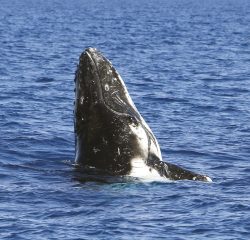
Whale breaching. Photo: Pennicott. Wilderness Journeys
The Value of Wildlife Tourism
“Value” can mean monetary value (for operators and local communities) and non-economic values (educational, aesthetic, ecological etc.).
Please visit:
-
- The value of wildlife tourism to Australia’s economy and environment: a report on the discussion at the national WTA workshop “Using Wildlife for Tourism: Opportunities, Threats, Responsibilities” in 2012.
- Using wildlife to value-add to tours and accommodation: a report on the discussion at the national WTA workshop “Using Wildlife for Tourism: Opportunities, Threats, Responsibilities” in 2012.
- Promotion of wildlife in the National Landscapes notes on a presentation at the national WTA workshop “Using Wildlife for Tourism: Opportunities, Threats, Responsibilities” in 2012.
- https://www.wildlifetourism.org.au/the-economic-value-of-birdwatching/ The economic value of birdwatching
- An interview with Professor Clem Tisdell on the economics of wildlife tourism Interview with Clem Tisdell
- Book review: A Handbook of Tourism Economics (much of relevance to wildife tourism within)
- Can wildlife tourism assist wildlife conservation? Can wildlife tourism assist wildlife?
- Wildlife Tourism: a Force for biodiversity conservation and local economies? Conference, 2015.Many presentations and discussions of relevance
- Importance of wildlife tourism to Africa “Hunting contributes less than 0.27% to a country’s GDP. By comparison, wildlife viewing tourism accounts for 96% of all tourism. Wildlife-based tourism generates more than $40billion annually in revenues into Africa.” https://www.iol.co.za/saturday-star/opinion/wildlife-is-critical-to-africas-economic-development-31574173
- Careers in wildlife tourism
- Our research literature page

http://www.coastweek.com/3632-news-30.htm
Kenya’s wildlife conservation efforts and possible assistance from China, with increase in Chinese tourists
Kenya plans to upgrade and diversify wildlife tourism (news, August 2013)
http://www.newera.com.na/articles/53497/Kenya-plans-to-diversify-tourism–curb-poaching
From the website:
“Poachers target especially rhinos and elephants for their tusks and skins, which fetch a lot of money in the black market. The bill will provide a comprehensive institutional framework for managing wildlife, human wildlife conflict, and compensation and ensure that wildlife is beneficial to those who live with the wildlife.”